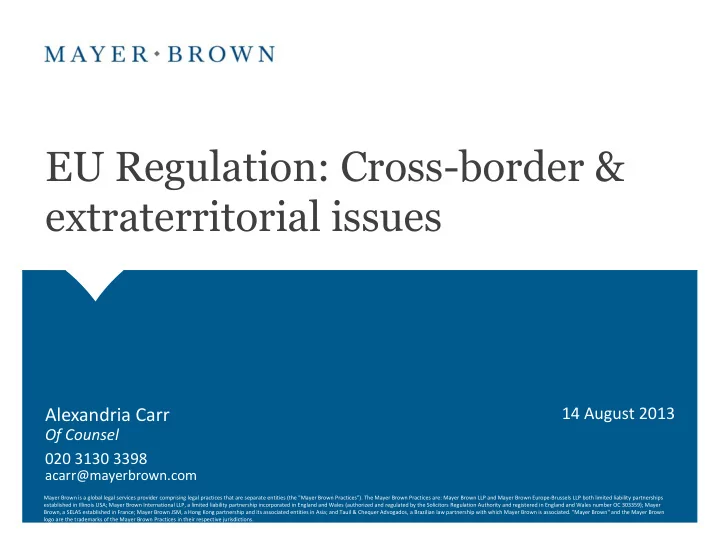

EU Regulation: Cross-border & extraterritorial issues Alexandria Carr 14 August 2013 Of Counsel 020 3130 3398 acarr@mayerbrown.com Mayer Brown is a global legal services provider comprising legal practices that are separate entities (the "Mayer Brown Practices"). The Mayer Brown Practices are: Mayer Brown LLP and Mayer Brown Europe-Brussels LLP both limited liability partnerships established in Illinois USA; Mayer Brown International LLP, a limited liability partnership incorporated in England and Wales (authorized and regulated by the Solicitors Regulation Authority and registered in England and Wales number OC 303359); Mayer Brown, a SELAS established in France; Mayer Brown JSM, a Hong Kong partnership and its associated entities in Asia; and Tauil & Chequer Advogados, a Brazilian law partnership with which Mayer Brown is associated. "Mayer Brown" and the Mayer Brown logo are the trademarks of the Mayer Brown Practices in their respective jurisdictions.
The European Puzzle The European Puzzle MiFID II CRD IV EMIR Short Selling AIFMD AIFMD Financial Financial Regulation Regulation Transaction Tax Recovery and Insolvency II MAD II resolution directive MAD II
The Financial Transaction Tax: The Basics The Financial Transaction Tax: The Basics • Plan: will only be adopted by a sub-set of the EU under a procedure known as the ‘enhanced cooperation procedure’ – Austria, Belgium, Estonia, France, Germany, Greece, Italy, Portugal, Slovakia, Slovenia and Spain • Original aim: national implementation by 30 September 30 • Original aim: national implementation by 30 September 30 2013 and FTT to come into effect on 1 January 2014 but timetable now extremely unlikely • Sets minimum levels of taxation: – 0.01% on derivatives – 0.1% on all other financial instruments (shares, bonds, etc) 3
The Financial Transaction Tax: Who Pays? The Financial Transaction Tax: Who Pays? • The FTT will be payable if: – Any party to a financial transaction is “established” in the FTT-zone and a financial institution is party to the transaction (acting as principal or agent), irrespective of where the transaction takes place (the “residence principle”); or principle”); or – If a financial instrument issued in the FTT-zone is traded anywhere and a financial institution is party to the transaction (acting as principal or agent), even if no party to the transaction is established within the FTT-zone (the “issuance principle”) 4
The Financial Transaction Tax: Where Are We The Financial Transaction Tax: Where Are We Now? Now? • Little will happen before the German elections in September 2013 and indications that the proposal will be narrowed • Possible that : – FTT will be restricted to issuance principle – FTT will be staggered so introduced initially re shares, then – FTT will be staggered so introduced initially re shares, then perhaps derivatives and then perhaps bonds – all rates reduced to 0.01% • No certainties 5
Bankers’ bonuses Bankers’ bonuses • Variable remuneration cannot exceed fixed remuneration, or, with the approval of shareholders, two times the fixed remuneration. • Bonus cap applies to credit institutions and some MiFID investment firms. Provisions apply to: investment firms. Provisions apply to: – all relevant institutions within the EEA, including offshore subsidiaries of an EEA parent institution; – non-EEA branches and subsidiaries of institutions which have their head office in the EEA; and – EEA subsidiaries (but not branches) of institutions which have their head office outside the EEA.
EMIR (EU Regulation of OTC Derivatives) EMIR (EU Regulation of OTC Derivatives) • Clearing obligation applies to contracts entered into by a counterparty in the EU and a third country entity (“T”) provided that T would be subject to the clearing obligation if it were established in the EU • Clearing obligation and the risk mitigation requirements • Clearing obligation and the risk mitigation requirements apply to contracts between Ts that would be subject to the clearing obligation if they were established in the EU, provided that the contract has a “direct, substantial and foreseeable effect within the” EU “or where such an obligation is necessary or appropriate to prevent the evasion of any provisions of” EMIR 7
Recommend
More recommend